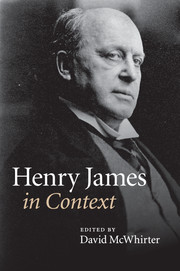Book contents
- Frontmatter
- Contents
- List of Illustrations
- Notes on Contributors
- Preface
- Abbreviations
- Chronology
- Part One Life and career, times and places
- Part Two Historical and cultural contexts
- Chapter 9 Aestheticism and Decadence
- Chapter 10 Authorship
- Chapter 11 Children
- Chapter 12 Consumer culture
- Chapter 13 Cosmopolitanism
- Chapter 14 Courtship, marriage, family
- Chapter 15 Ethics
- Chapter 16 Language
- Chapter 17 Law
- Chapter 18 Manners
- Chapter 19 Media and communication technologies
- Chapter 20 Modernism
- Chapter 21 Money and class
- Chapter 22 Museums and exhibitions
- Chapter 23 Nationalism and imperialism
- Chapter 24 Print culture
- Chapter 25 Psychology
- Chapter 26 Race
- Chapter 27 Realism and naturalism
- Chapter 28 Sexualities and sexology
- Chapter 29 Social sciences and the disciplines
- Chapter 30 Things
- Chapter 31 Time
- Chapter 32 Travel and tourism
- Chapter 33 Urbanity
- Chapter 34 Visual culture
- Chapter 35 Women and men
- Chapter 36 Work
- Part Three Reception
- Further reading
- Index
- References
Chapter 21 - Money and class
Published online by Cambridge University Press: 05 August 2014
- Frontmatter
- Contents
- List of Illustrations
- Notes on Contributors
- Preface
- Abbreviations
- Chronology
- Part One Life and career, times and places
- Part Two Historical and cultural contexts
- Chapter 9 Aestheticism and Decadence
- Chapter 10 Authorship
- Chapter 11 Children
- Chapter 12 Consumer culture
- Chapter 13 Cosmopolitanism
- Chapter 14 Courtship, marriage, family
- Chapter 15 Ethics
- Chapter 16 Language
- Chapter 17 Law
- Chapter 18 Manners
- Chapter 19 Media and communication technologies
- Chapter 20 Modernism
- Chapter 21 Money and class
- Chapter 22 Museums and exhibitions
- Chapter 23 Nationalism and imperialism
- Chapter 24 Print culture
- Chapter 25 Psychology
- Chapter 26 Race
- Chapter 27 Realism and naturalism
- Chapter 28 Sexualities and sexology
- Chapter 29 Social sciences and the disciplines
- Chapter 30 Things
- Chapter 31 Time
- Chapter 32 Travel and tourism
- Chapter 33 Urbanity
- Chapter 34 Visual culture
- Chapter 35 Women and men
- Chapter 36 Work
- Part Three Reception
- Further reading
- Index
- References
Summary
James the aesthete was notorious for denying any knowledge of the workings of the business world. Taking him at his word, an earlier generation of scholars writing on James and economic matters limited themselves to biographical accounts of his ambivalence towards business and to ahistorical analyses of the writer’s money imagery in his fiction. However, a more historically anchored approach to his work reveals James to have been rather disingenuous about his supposed ignorance, since he consistently attends to the complexity of economic history over the course of his career in the creation of his characters and the plots of his stories.
As an American writer in Europe who published on both continents, James had a front-row seat to a wide range of economic changes. For both Europe and the United States, the mid to late nineteenth century was a period of considerable economic growth and turmoil, as changing class structures and the growing use of paper money impacted on trends in contemporary cultural practices and tastes. James was most likely aware of such developments: as publishing historians have shown, the publishing sector of the economy was directly affected by business innovations, which resulted in the forging of a link between the business realm and the art world. In his fiction, James investigates those psychological and aesthetic implications that stem from developments in capitalism, ranging from new ways of handling risk and uncertainty to proto-modernist conceptions of artistic representation.
- Type
- Chapter
- Information
- Henry James in Context , pp. 224 - 233Publisher: Cambridge University PressPrint publication year: 2010



